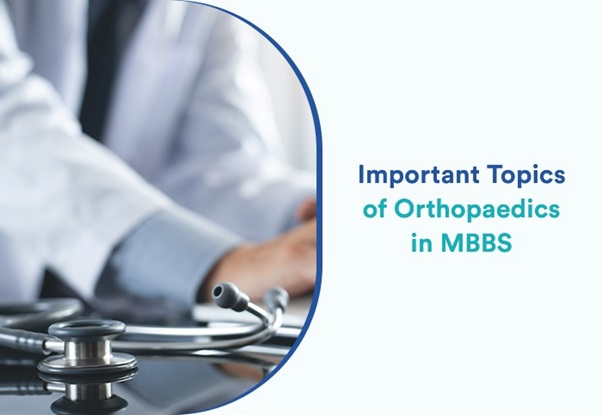One important and specialised field of medicine that largely deals with a person’s musculoskeletal system is orthopaedics. The musculoskeletal system of the human body enables support and stability for the motions of the body. Bones, ligaments, muscles, skeletal joints, tendons, etc., together make up this complex network. Collectively, they control the body’s movement and respective functions. It is critical to emphasise that every undergraduate student must be familiar with the entire human musculoskeletal system.
Some of the important topics to cover in Orthopaedics for undergrads are:
1. Orthopaedic Trauma:
It includes injuries of joints, ligaments, muscles, and tendons as well as pathological fractures, eponymous fractures, and the classification of fractures. This topic covers in detail the initial examination of fractures, such as determining whether it is purely traumatic or is underlying pathology, whether it is a “high-velocity” injury where the fracture is likely to be unstable with a lot of associated injury or a “low-velocity” injury. It also covers topics such as fracture pattern in order to determine its inherent stability, forces causing the fracture, simple or complex fracture,and much more.
2. Anatomy of Bone and Fracture Healing:
It covers bone anatomy, long bone growth, bone blood supply, fracture healing, cancellous bone healing, primary and secondary bone healing, and fracture healing variables. A long bone can have a diaphysis, metaphysis, and epiphysis, among other sections. Some illnesses often affect specific bone structures. Growth plates are a sign that the skeleton is developing. The basic structural unit known as the osteon makes up the intricate structure of the bone. Different bone cells serve various purposes. There are several stages in the healing of a fracture. Many different factors affect how quickly a fracture heals.
3. General Principle of Treatment of Fractures:
It features phase I which is emergency care, phase II of definitive care, and phase III of rehabilitation of a fractured limb, as well as management of open fractures. Fracture treatment consists of keeping the fracture in an acceptable position till union. This can be done by non-operative methods or operative methods. Non-operative methods consist of bandaging, plaster application, use of brace, traction, etc. Operative treatment comprises the reduction of the fracture and hold it in position by internal fixation or external fixation. Open fractures are serious injuries, as they are more prone to complications. Adequate wound care and fracture treatment are required.
4. Spinal Injuries:
This study area covers pertinent anatomy, injury biomechanics, classification, clinical characteristics, evaluation, research, and care. Bony and neurological injuries combine in a complex way to cause spinal damage. To avoid neurological damage, careful attention must be given from the time of the accident until complete recuperation. The most crucial factor in determining whether to choose an operation or a non-operative treatment is the stability of the affected spine. The trend is for spinal injuries to be surgically stabilised and treated at specialised facilities.
5. Degenerative Disorders:
It addresses lumbar, cervical, and osteoarthritis spondylosis. Osteoarthritis is a gradual, degenerative condition. Usually, the knee and back are affected. If the causes are known, treatment can be preventive. Once advanced, the only treatments left are surgery and physical rehabilitation.
Go the extra mile with online courses in Orthopaedics
As a result of the massive digitalisation of education, students now have limitless access to study materials online to acquire a competitive edge over their peers. Nowadays, a lot of students turn to the affordable online orthopaedic courses offered in India. There are several platforms available in the market that provide online Orthopaedics for Under Grads courses. It helps you grasp the fundamentals and retain them through practice assessments, including orthopaedics MCQs online.
Orthopaedics for UnderGrads is a thorough knowledge-based course that aids in creating a solid foundation for theoretical knowledge and practical skills in undergraduates. It provides detiailed knowledge on neurological conditions, kinds of fractures, and more. You can get easy notes, video lectures and case scenarios from top orthopaedics faculty. To make sure you remember every bit of material, the course includes practice questions on a range of topics, which promote active learning. Orthopaedics MCQs online comes handy with lectures to ensure that students are constantly challenged while also reinforcing their knowledge.












